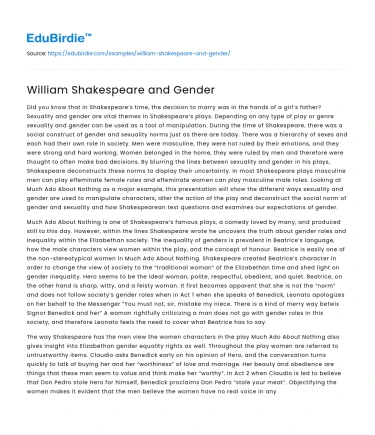Did you know that in Shakespeare’s time, the decision to marry was in the hands of a girl’s father? Sexuality and gender are vital themes in Shakespeare’s plays. Depending on any type of play or genre sexuality and gender can be used as a tool of manipulation. During the time of Shakespeare, there was a social construct of gender and sexuality norms just as there are today. There was a hierarchy of sexes and each had their own role in society. Men were masculine, they were not ruled by their emotions, and they were strong and hard working. Women belonged in the home, they were ruled by men and therefore were thought to often make bad decisions. By blurring the lines between sexuality and gender in his plays, Shakespeare deconstructs these norms to display their uncertainty. In most Shakespeare plays masculine men can play effeminate female roles and effeminate women can play masculine male roles. Looking at Much Ado About Nothing as a major example, this presentation will show the different ways sexuality and gender are used to manipulate characters, alter the action of the play and deconstruct the social norm of gender and sexuality and how Shakespearean text questions and examines our expectations of gender.
Much Ado About Nothing is one of Shakespeare’s famous plays, a comedy loved by many, and produced still to this day. However, within the lines Shakespeare wrote he uncovers the truth about gender roles and inequality within the Elizabethan society. The inequality of genders is prevalent in Beatrice’s language, how the male characters view women within the play, and the concept of honour. Beatrice is easily one of the non-stereotypical women in Much Ado About Nothing. Shakespeare created Beatrice’s character in order to change the view of society to the “traditional woman” of the Elizabethan time and shed light on gender inequality. Hero seems to be the ideal woman, polite, respectful, obedient, and quiet. Beatrice, on the other hand is sharp, witty, and a feisty woman. It first becomes apparent that she is not the “norm” and does not follow society’s gender roles when in Act 1 when she speaks of Benedick, Leonato apologizes on her behalf to the Messenger “You must not, sir, mistake my niece. There is a kind of merry way betwix Signor Benedick and her” A woman rightfully criticizing a man does not go with gender roles in this society, and therefore Leonato feels the need to cover what Beatrice has to say.
Save your time!
We can take care of your essay
- Proper editing and formatting
- Free revision, title page, and bibliography
- Flexible prices and money-back guarantee
The way Shakespeare has the men view the women characters in the play Much Ado About Nothing also gives insight into Elizabethan gender equality rights as well. Throughout the play women are referred to untrustworthy items. Claudio asks Benedick early on his opinion of Hero, and the conversation turns quickly to talk of buying her and her “worthiness” of love and marriage. Her beauty and obedience are things that these men seem to value and think make her “worthy”. In Act 2 when Claudio is led to believe that Don Pedro stole Hero for himself, Benedick proclaims Don Pedro “stole your meat”. Objectifying the women makes it evident that the men believe the women have no real voice in any matter; they are there for the taking and meant to be submissive. The frequency of deceiving jokes suggests that the men also believe that women by nature are untrustworthy and unfaithful. Benedick basically compares marriage to a prison – saying a married man is a man who gets cheated on.
Many people still stick to traditional ideas that both genders should behave in ways that fall into specific categories determined solely on their gender. Gender roles are social constructs developed over time and are not based on natural human behaviour. This is because gender roles advanced as a way to establish the necessary tasks done in early human society. Some may say that due to the fact that traditional gender stereotypes have been followed for so long, they should not be changed, and are now a key section in human development. As a result of this many people struggle to reach their full potential. This is because social expectations of each gender change over a time period, and often develop differently in cultures around the world. Sara Bobolts, a writer for The Huffington Post, stated how several common gender stereotypes changed over time. She describes how gender stereotypes, such as the colour blue being for boys and the colour pink being for girls, are new concepts. She explains that between the years 1918 and 1940, pink was viewed as a masculine colour, while blue was seen dainty and soft, making it best suited for females.
Through Shakespeare’s play Much Ado About Nothing, Shakespeare exposes the dark truth that is gender inequality of the Elizabethan time. He does so through the character Beatrice, with her language that speaks and craves for gender equality. She considers herself to be equal of some sorts with her wits and attempts to defy the norms by vowing to not marry in order to be an unmarried woman but is aware that society does not allow her a true voice when it comes to defending herself or her friends. The way that the men treat the women in this play also gives understanding into how women of this time were viewed. It is made clear that they are viewed mostly as items that tend to not be loyal. It’s no surprise if they are found to be dishonest, but at the same time the men must constantly keep their honour intact. Characters are disposed to limitations and expectations based on gender and challenges our stereotypes, which is a major theme of Much Ado About Nothing.






 Stuck on your essay?
Stuck on your essay?

